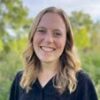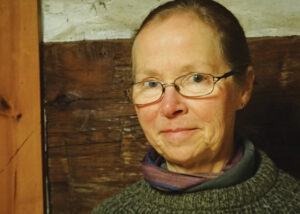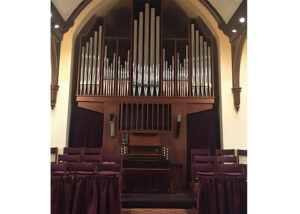It’s Sunday afternoon, and I’m staring at a storm drain. The “Adopt-A-Drain” website led me here. The commitment seems simple. Name the drain, check it regularly and clear debris before and after storms. The promise? Cleaner rivers and less flooding.
I name it “Singing in the drain.” Others in my neighbourhood include “Catherine the Grate” and “Sweet drains are made of this.”
My church got me to pay attention to storm drains.
Our small Mennonite congregation is in a moment of reorientation, like many of us. So much is changing—climate, politics, our social fabric.
Who do we want to be to one another?
Who do we want to be to one another? Some members suggest “a small experiment with radical intent”: to seek spiritually grounded, justice-seek- ing responses to climate change in our community. Our congregation is connected by a watershed. One young woman suggests we answer the local watershed association’s call to adopt drains. A woman in her eighties says, “I’ve already adopted two!”
We’ve been talking about storm drains ever since.
This feels like a beautiful example of communal discernment: asking who we are, where our energy lies, and how we might act.
I also feel cautious. Small actions like adopting drains or installing solar panels can easily become ends in themselves. Worse, they risk becoming theologically rhetorical. Adopting a drain may be an act of love for neighbours downstream, but if my only action is to clear debris, I risk overlooking deeper inequalities between neighbours in our watershed.
What might adopting a drain ask of me?
I follow the water flowing through it. Water in my neighbourhood runs over concrete, collecting trash and contaminants. It flows into a combined sewer system; during heavy rains, raw sewage spills into waterways. These pollutants concentrate near low-income communities of colour—patterns shaped by mid-20th-century discriminatory housing policies. Wealthier neighbourhoods gained manicured lawns and wide roads; others bear the environmental burden.
This design has theological implications, revealing our desires, relationships, and what we hold sacred. Following the water, I see stories of disordered desires for control, ownership, and protection. Who do we want to be to one another? What do we desire? These questions are at the heart of climate change conversations—and the work of the church.
Are we courageous enough to follow the water? To be changed?
I recently joined a boat tour of the watershed’s industrial corridor. I met Maria, a Spanish-speaking woman who has lived behind the oil refinery near the river for decades. She had never been on the river. “I wish my community had river access,” she said. Maria loves her community but worries she won’t be able to stay—her rent keeps rising.
I clear leaves from my drain and remember Maria. How might I structure my life to stay in relationship with Maria and others who struggle? The design of our cities and the rhythms of our lives often separate us, but our well-being is bound together. What does this ask of us? Theologian Willie Jennings suggests we start by “reintroducing the church to the story of what it means to be a Christian: the constant entering into and becoming part of other people’s story for the sake
of love.”
Our scriptures remind us that we are outsiders, invited by Jesus into God’s redemptive story. Jesus gathers people to journey with him, asking them to give up possessions and to reimagine family. Jesus draws his followers into desolate landscapes and social margins, inviting them to enter the lives of others for the sake of love.
That love changes us.
Following Jesus means considering how we organize our lives in material ways. What do we hold sacred? What do we seek to control? What are we willing to give up? These are not rhetorical questions. They may call us to reduce consumption, reimagine property ownership, or show up at public meetings on zoning reform and affordable housing.
These can be spiritually grounded, justice-seeking actions. But they become theological when we test them against the way of Jesus. Today, this means I’m standing at a storm drain and asking: where does the water flow, and who does love call me to follow?
Anika Reynar works in Boston as a facilitator and mediator in environmental disputes.
Responses
Held by Ryan Dueck
What a rich metaphor Anika has provided: follow the water. Consider the impacts of our habits and assumptions, our ways of being in the world. Pay attention to who bears disproportionate burdens and why. Who do we want to be to one another?
It’s such an important question for every church to be asking, not least because of the assumption embedded within it. We actually do believe (or want to believe) that we have obligations to one another, that our well-being—physically, emotionally, spiritually—is bound up with that of our neighbour.
I love the Jennings quote that Anika includes. Surely, the “constant entering into and becoming part of other people’s stories for the sake of love” is an important part of what it means to be a Christian. But the amateur theologian in me wants to say more. For surely what it means to be a Christian is also to trust the God who in Christ reaches down to save us even when, despite our best intentions and efforts, we cannot be enough for one another. We are held by a love that is deeper than we can manage on our own, a love that sends us back into our smaller stories with freedom and grace.
Ryan Dueck is pastor at Lethbridge (Alberta) Mennonite Church.
Calling by Cindy Wallace
I love the concreteness of Anika’s “small experiment with radical intent”: it’s local, tangible, scaled for life. I also love that this care for a storm drain began in community discernment and leads back out to community in a widening sense of “who is my neighbour?
The experiment reminds me a bit of biologist Ayana Elizabeth Johnson’s model for how each person can become involved in climate action, which is a Venn diagram of three questions: “1. What are you good at? 2. What work needs doing? 3. What brings you joy?” This model, in turn, makes me think about theologian Frederick Buechner’s famous definition of God’s calling as the place where “your deep gladness and the world’s deep hunger meet.”
God seeks to bless the world through the church. This is why we are here, gathered into the Body of Christ, empowered by the Spirit. We are called to bring our delight and gifts—and sometimes our stubborn persistence— to the work that is ours to do, to the storm drains and the advocacy campaigns, both the hyper-local and the global. This work is not without risks—but Jesus’s example, and the faithful through the centuries, remind us that love never is.
Cindy Wallace is professor of English at St. Thomas More College at the University of Saskatchewan.
Risk by Justin Sun
“Are we courageous enough to follow the water? To be changed?”
This question is a gut punch these days, when all around I wonder why the dominant answer appears to be a resounding “No,” if news reels, institutional manoeuvres and elections are any indication.
Two of Anika’s points ring particu- larly clear. The first is that following the water might cost us something, and that is why it takes courage. It is easier to buy into the lie that only some can win, so hoarding, stepping-over and building walls—controlling and protecting, in Anika’s words—become the only logical steps. In contrast, it is harder to trust, give and surrender, because in so doing, we risk our very selves.
The second thing that rings clear is how the talk of water echoes a practice at the heart of Christianity—baptism. Thousands of years of reflection rest upon this foundational act of rebirth and transformation, beckoning people to lay down their arms and walk (swim) the Jesus Way. This reminds us that we can strive with confidence, knowing that the one who has gone before risked it all that we might know the way.
In this, I know: the communal risking of self is a resounding, “Yes, we are courageous enough to follow and change.”
Justin Sun is a student at Vancouver School of Theology/Vancouver Coastal Health.








Leave a Reply
You must be logged in to post a comment.